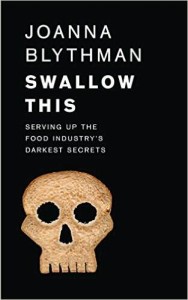Book Review: “Swallow This” by Joanna Blythman
by Jan
 This book was chosen for the Slow Food Sydney Book Group. We can’t say we enjoyed it, but everyone thought it was scary because the various food safety authorities seem to wave through food products as safe.
This book was chosen for the Slow Food Sydney Book Group. We can’t say we enjoyed it, but everyone thought it was scary because the various food safety authorities seem to wave through food products as safe.
Here’s what is written on the fly-leaf:
Don’t trust those upbeat claims you see on food packaging. Behind the clamour of ‘clean’ labels, emblazoned with reassuring tick lists and additive-free claims, stand companies that exploit the creed of commercial confidentiality to stop us knowing how our food is made.
The paramount goal of the modern food processing industry isn’t giving us healthy life-sustaining food, but manufacturing lucrative products at the lowest possible production cost, using every trick in the book. It is aided and abetted in this mission by powerful supermarkets that have more to gain from selling us complex, multi-ingredient products than honest-to-goodness whole foods. The process food industry, which is aligned to the global chemical industry, takes full advantage of weak regulation. Driven by brinkmanship and a cavalier safe-until-proven-dangerous attitude, it foists on us new, inadequately tested technologies that compromise the integrity of natural foods, without stopping to question what this might be doing to our health.
It pretty much sums up the book. It’s not about horse meat substitution, or passing off foreign onions as Australian. It’s more about what goes into prepared meals and any ready-to-eat products from retail outlets. Even a bag of lettuce has been rinsed in water which has had chemicals added to it so that it won’t go brown, and therefore lasts longer on the shelf.
There are chemicals which keep food: from discolouring, going stale on the shelf, looking a pallid colour, tasting sweeter, tasting saltier, becoming misshapen when packed. Some of these chemicals have names which sound like ‘ethyl methyl deathyl’. What’s more incredible is this:
….I rapidly realised that for big companies with a finger in many business pies, food processing is just another revenue stream. They experience no cognitive dissonance in providing components not only for your ready meal, but also for your fly spray, air freshener, shower sealant, deodorant, computer casing, scratch resistant car coating, paint and glue. But as a food manufacturing outsider, this queasy juxtaposition of the industrial and the edible comes as a sobering shock. (p 77)
This sounds like the battle with Big Tobacco and Big Sugar. Recently, there was a Canadian doco on SBS television about the sugar industry in North America. There were some shocking data about the increase in people developing diabetes in the last few decades. Plus the fact that when large companies price their products, the cost of potential litigation is factored in as a cost.
So, it’s not just that people are swallowing unsafe chemicals, but that large corporations which can afford legal and public relations representation, pay to defend these indefensible practices.